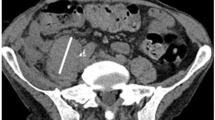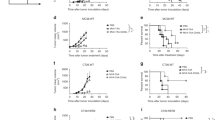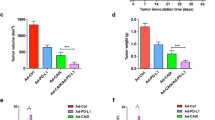Abstract
The interaction between CD40 ligand (CD40L) and CD40 on antigen-presenting cells is essential for the initiation of antigen-specific T-cell responses. In order to clarify whether the expression of CD40L in tumor cells might be useful as a systemic therapy against bladder cancer, we investigated the antitumor immunity induced by CD40L in the mouse bladder cancer cell line MBT2. MBT2 was transduced by the retroviral vector expressing CD40L (MBT2–CD40L). Mouse bone marrow-derived dendritic cells cocultured with MBT2–CD40L cells produced eight times more IL-12 than those cocultured with parental MBT2 cells. In animal studies, subcutaneously inoculated MBT2–CD40L cells were rejected promptly. The vaccination of MBT2–CD40L cells induced antitumor immunity against parental tumors at a distant site. However, the antitumor effect of MBT2–CD40L inoculation was insufficient against pre-existing tumors. In the vaccination model, antibody ablation studies revealed that CD4+ T cells were required for antitumor immunity, and tumor-specific cytotoxicity of sera was demonstrated. These data demonstrated that the antitumor immunity induced by CD40L was effective in the vaccination model and suggested that immunogene therapy using CD40L may be a new strategy of systemic therapy against bladder cancer.
This is a preview of subscription content, access via your institution
Access options
Subscribe to this journal
Receive 12 print issues and online access
$259.00 per year
only $21.58 per issue
Buy this article
- Purchase on Springer Link
- Instant access to full article PDF
Prices may be subject to local taxes which are calculated during checkout








Similar content being viewed by others
References
Eto M, Harada M, Tamada K, et al. Antitumor activity of interleukin-12 against murine bladder cancer. J Urol. 2000;163:1549–1552.
Grossmann ME, Brown MP, Brenner MK . Antitumor responses induced by transgenic expression of CD40 ligand. Hum Gene Ther. 1997;8:1935–1943.
Nakajima A, Kodama T, Morimoto S, et al. Antitumor effect of CD40 Ligand: elicitation of local and systemic antitumor responses by IL-12 and B7. J Immunol. 1998; 161:1901–1907.
Kikuchi T, Crystal RG . Anti-tumor immunity induced by in vivo adenovirus vector-mediated expression of CD40 ligand in tumor cells. Hum Gene Ther. 1999;10:1375–1387.
Durie FH, Foy TM, Masters SR, et al. The role of CD40 in the regulation of humoral and cell-mediated immunity. Immunol Today. 1994;15:406–411.
Grewal IS, Flavell RA . CD40 and CD154 in cell-mediated immunity. Annu Rev Immunol. 1998;16:111–135.
Jenkins MK . The ups and downs of T cell costimulation. Immunity. 1994;1:443–446.
Caux C, Massacrier C, Vanbervliet B, et al. Activation of human dendritic cells through CD40 cross-linking. J Exp Med. 1994;180:1263–1272.
Cella M, Scheidegger D, Palmer-Lehmann K, et al. Ligation of CD40 on dendritic cells triggers production of high levels of interleukin-12 and enhances T cell stimulatory capacity: T-T help via APC activation. J Exp Med. 1996;184:747–752.
Koch F, Stanzl U, Jennewein P, et al. High level IL-12 production by murine dendritic cells: upregulation via MHC class II and CD40 molecules and downregulation by IL-4 and IL-10. J Exp Med. 1996;184:741–746.
Robbins PB, Yu XJ, Skelton DM, et al. Increased probability of expression from modified retroviral vectors in embryonal stem cells and embryonal carcinoma cells. J Virol. 1997;71:9466–1974.
Pear WS, Nolan GP, Scott ML, et al. Production of high-titer helper-free retroviruses by transient transfection. Proc Natl Acad Sci USA. 1993;90:8392–8396.
Danos O, Mulligan RC . Safe and efficient generation of recombinant retroviruses with amphotropic and ecotropic host ranges. Proc Natl Acad Sci USA. 1988;85:6460–6464.
Joki T, Kikuchi T, Akasaki Y et al. Induction of effective antitumor immunity in a mouse brain tumor model using B7-1 (CD80) and intercellular adhesive molecule 1 (ICAM-1; CD54) transfection and recombinant interleukin 12. Int J Cancer. 1999;82:714–720.
Akasaki Y, Kikuchi T, Homma S, et al. Antitumor effect of immunizations with fusions of dendritic and glioma cells in a mouse brain tumor model. J Immunother. 2001;24:106–113.
Kikuchi T, Akasaki Y, Joki T, et al. Antitumor activity of interleukin-18 on mouse glioma cells. J Immunother. 2000;23:184–189.
Monach PA, Schreiber H, Rowley DA . CD4+ and B lymphocytes in transplantation immunity. Transplantation. 1993;55:1356–1361.
Fujieda M, Oishi N, Kurashige T . Antibody to endothelial cells in Kawasaki disease lyse endothelial cells without cytokine pretreatment. Clin Exp Immunol. 1997;107:120–126.
Loskog A, Bjorkland A, Brown MP, et al. Potent antitumor effects of CD154 transduced tumor cells in experimental bladder cancer. J Urol. 2001;166:1093–1097.
Acknowledgements
We thank Dr H Yagita for kindly providing mouse CD40L cDNA, Dr I Hara for MBT2, Dr DB Kohn for retroviral vector pMND-X-SN, Dr S Saito for hybridoma GK 1.5 and 56.6.73, Dr S Honma and Dr N Kuwashima for helpful advice, and Ms C Yoshimoto and Ms S Iizuka for excellent technical assistance. This study was supported in part by the Takeda Science Foundation.
Author information
Authors and Affiliations
Corresponding author
Rights and permissions
About this article
Cite this article
Kimura, T., Ohashi, T., Kikuchi, T. et al. Antitumor immunity against bladder cancer induced by ex vivo expression of CD40 ligand gene using retrovirus vector. Cancer Gene Ther 10, 833–839 (2003). https://doi.org/10.1038/sj.cgt.7700627
Received:
Published:
Issue Date:
DOI: https://doi.org/10.1038/sj.cgt.7700627
Keywords
This article is cited by
-
Local Immune Stimulation by Intravesical Instillation of Baculovirus to Enable Bladder Cancer Therapy
Scientific Reports (2016)
-
Immunotherapy for superficial bladder cancer
Cancer Immunology, Immunotherapy (2005)



